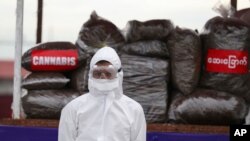The chaos in Myanmar could see a surge in meth production across the’ Golden Triangle’, the United Nation’s organized crime agency said Tuesday, as ethnic militias seek quick cash to firm up their positions in lawless borderlands whose fragile equilibrium has been disrupted by the coup.
Drug lords entwined with rebel groups in Myanmar’s ungovernable border zone with Laos, Thailand and China - the notorious Golden Triangle - have been pumping record amounts of methamphetamine across Southeast Asia.
They churn out precursor chemicals and yaba ‘crazy medicine’ pills and the more addictive - and expensive - crystal meth to a regional market worth up to an estimated $70 billion a year.
The February 1 coup in Myanmar has stoked instability in border regions where complex alliances among rebel groups, drug lords and affiliates of Myanmar’s army have kept an uneasy order, where skirmishes can be smoothed over by a shared interest in keeping the narco money flowing.
But those alliances have been put in jeopardy after Myanmar’s army - known as the Tatmadaw - unexpectedly seized power, tipping the country into violent instability and flatlining the economy as pro-democracy protests defy a violent crackdown across the country.
“The economy in Myanmar is grinding to a halt, we now see the past week several arms groups making a push to strengthen their position, so fundamentally they need money,” Jeremy Douglas of the UNOCD told VOA news.
“Either they’re involved (in) or are taxing the drug trade… so what we’re looking at is the fastest way to make big money is the drug trade.”
Instability could push the rebel groups who control the drug labs into increasing production.
Already Myanmar’s army has launched airstrikes against ethnic majority areas bordering Thailand for the first time in many years, spurring thousands of Karen refugees to flee towards the frontier.
Route Laos
The drug trade of the Golden Triangle has morphed over the last two decades from heroin and opium to focus on methamphetamine.
It relies on virtually open borders to reach Southeast Asia’s vast markets - and as far as Australia and New Zealand.
One of the top networks, the ‘Sam Gor,’ was dealt a blow when its alleged leader Tse Chi Lop was arrested in Amsterdam on a warrant from Australian police. One of his top lieutenants, Hong Kong citizen Lee Chung Chak, was arrested in October last year on an exclusive Bangkok street.
But the meth trade pivots on the ready availability of precursor chemicals - including P2P and pseudoephedrine. The commonly used chemicals come from factories in China, India, Thailand and Vietnam. They are hard to separate from their legitimate use in medicine and agriculture and are easily disguised as different compounds and smuggled across borders marshaled by low-paid law enforcement.
Last year Laos seized more than 70 tons of precursors as the drug gangs use the country as a run through from Vietnam to the drug labs of Myanmar, a police source in the Communist-run country who requested anonymity to discuss the matter, told VOA news.
The huge hauls were blocked in Bokeo province, the border to Myanmar’s Shan State, where drug labs produce meth and then send it back hidden in tea packets destined for Thailand, Malaysia and beyond.
“It’s impossible to estimate how much meth these chemicals could have made,” the police source said.
Thai drug officials fear further insecurity in Myanmar will play out into more drugs heading south.
“The more serious the situation and the more money is needed... the production capacity always needs to match the demand and Thailand will certainly be caught in any overflow of drugs,” said Suriya Singhakamon Deputy Secretary General of the Office of Narcotics Control Board (ONCB).
In a region already awash with labs, precursors and drug networks skilled in the logistics of moving tons of product to the market, Myanmar’s fast-forwarded descent into instability is a cause of concern.
“We don’t know what’s about to happen, but we all know it’s not going to be good,” says Douglas of the UNODC. We don’t know how many drugs are coming, but they’re going come.”




